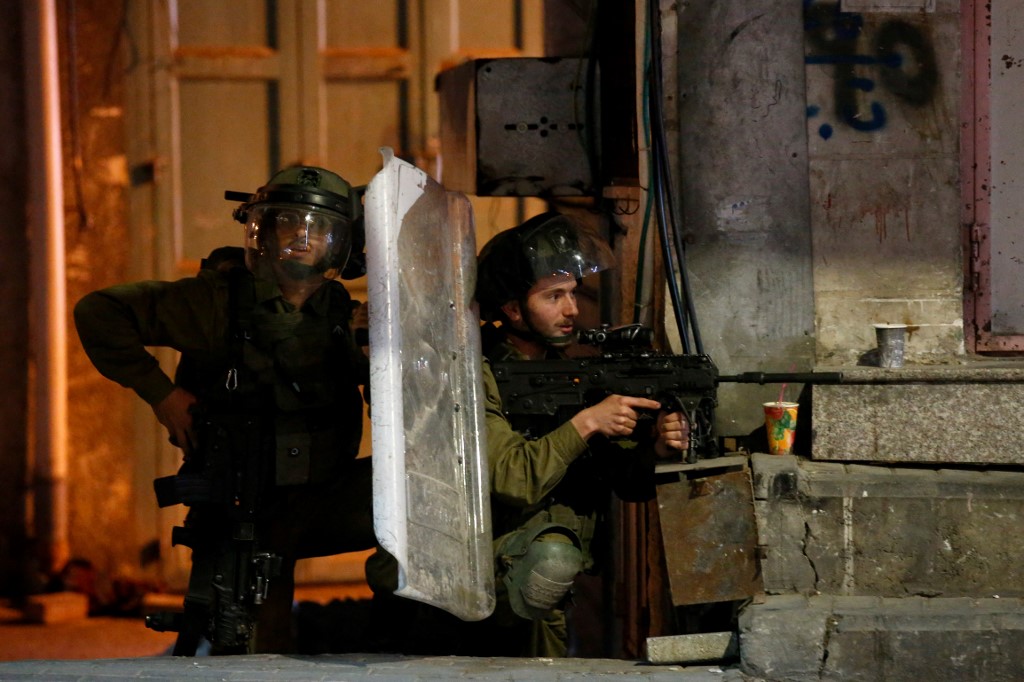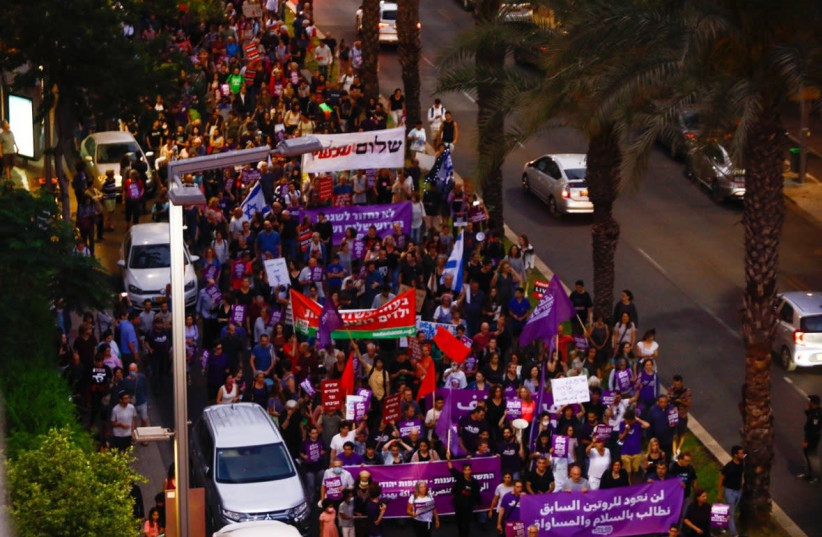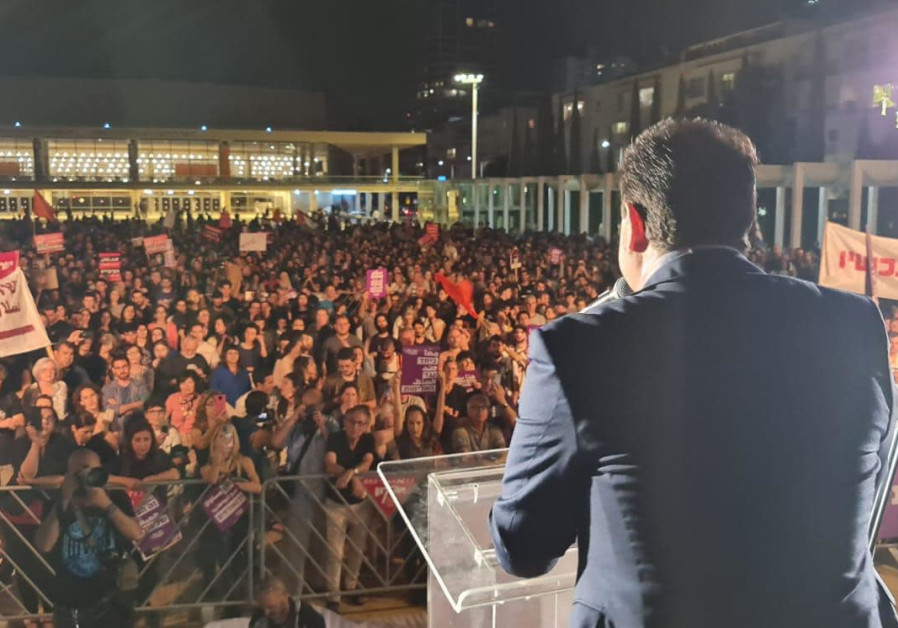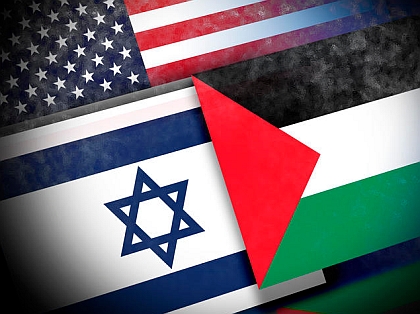M WAQAR..... "A man's ethical behavior should be based effectually on sympathy, education, and social ties; no religious basis is necessary.Man would indeed be in a poor way if he had to be restrained by fear of punishment and hope of reward after death." --Albert Einstein !!! NEWS,ARTICLES,EDITORIALS,MUSIC... Ze chi pe mayeen yum da agha pukhtunistan de.....(Liberal,Progressive,Secular World.)''Secularism is not against religion; it is the message of humanity.'' تل ده وی پثتونستآن
Saturday, May 22, 2021
Thousands of Jews and Arabs march in Tel Aviv for peace, coexistence
Protesters voiced support for the recent ceasefire between Israel and Hamas and called on the government to take immediate action to reach peace with the Palestinians.
"These past few days have shown us how life in this country can look like - a nightmare," Zandberg added. "We don't want to start waiting for the next war, but to change direction toward peace - to live together in true partnership."A similar protest took place last Saturday at Habima Square, which was one of several protests attended by Jews and Arabs across the country that called for peace and for coexistence amid the nationwide riots and the military operation in Gaza. Jews and Arabs gathered daily during Operation Guardians of the Walls on bridges and intersections along the country and protested against the ongoing violence. Also on Saturday, hundreds gathered outside the Prime Minister's Residence in Jerusalem, calling on Prime Minster Benjamin Netanyahu to resign and blaming him for the escalation in Gaza and claiming that he deliberately extended the operation for no reason but personal interest. Earlier Saturday, about 200 people marched along the streets of the mixed city of Jaffa, voicing support for coexistence between Arabs and Jews while visiting small local businesses.
https://www.jpost.com/israel-news/thousands-of-jews-and-arabs-march-in-tel-aviv-for-peace-coexistence-668852
#Israel-#Palestine: A new generation says 'enough is enough'
BY Azzam Tamimi
Anger and frustration have been deepened by a decade that saw Arab governments in the region relegate the Palestinian cause to the margins of their politics.
This is not the first war between Gaza and the Zionist regime occupying Palestine. It is the fourth major confrontation in less than 13 years - but this one is different.
Firstly, it was Hamas that initiated the battle in retaliation for Israel’s desecration of al-Aqsa Mosque and the attempt to forcibly remove Palestinian families from their homes in Jerusalem’s Sheikh Jarrah neighbourhood, to be replaced by Jewish settlers.
Secondly, the confrontation coincided with an unprecedented show of unity and solidarity across the occupied West Bank, ’48 Palestine and the diaspora. All were brought together by flagrant Israeli provocations over what Muslims around the world consider to be their third-holiest place of worship on earth.
This generation was born into a completely different reality. Very little territory was left for any meaningful Palestinian state
Thirdly, an entirely new generation of young men and women is at the forefront, challenging an increasingly fanatical Jewish society and extreme right-wing Israeli government. This generation is under no illusions about the occupation. Most of its members were born well after the Oslo Accords, which were supposed to lead to a Palestinian state in the West Bank and Gaza.
Instead, this generation was born into a completely different reality. Very little territory was left for any meaningful Palestinian state. Since 1967, and more actively since 1993, Israel has confiscated more land, built more settlements, expanded existing ones, and demolished more Palestinian houses. The new generation did not have a state waiting for them, but rather a Palestinian Authority, the main outcome of Oslo, which colludes with Israel in oppressing Palestinians.
Normalisation with Israel
The disappointment, bitterness, anger and frustration felt by this new generation have been deepened by a decade that saw Arab governments in the region relegate the Palestinian cause to the margins of their politics. This culminated with the decision by several Arab states to normalise relations with Israel, despite the latter’s push to annex more land and declare Israel a Jewish supremacist state.
The standoff at al-Aqsa Mosque and Sheikh Jarrah was the straw that broke the camel’s back. Under Prime Minister Benjamin Netanyahu, Israel has been shifting to the extreme right of the political spectrum, giving increasing power to the Religious Zionist camp, which believes that Palestine was promised to them by God and they are thus entitled to dispossess Palestinians. They are particularly focused on al-Aqsa Mosque, which they believe will ultimately become the site of a third temple.

To prepare the landscape for such an eventuality, they have claimed ownership of Palestinian homes near the mosque, including in Sheikh Jarrah, and used Israel’s apartheid court system to legalise evictions. Acting with impunity and protected by Israeli security forces, the Jewish extremists organise provocative marches within Jerusalem, and at times storm al-Aqsa Mosque complex.
The latest flareup came as settlers organised a big rally to celebrate the anniversary of the occupation of East Jerusalem in 1967. During the holy month of Ramadan, Israeli police and settlers intimidated and harassed Muslim worshippers, including through the implementation of measures to restrict access to the mosque by Palestinians from the occupied West Bank.
As provocations and tensions escalated, worshippers, most of whom happened to be members of the new generation of Palestinians, stood up to police, ultimately leading to the removal of barriers from the Damascus Gate plaza.
Profound grievances
As tensions simmered, Hamas warned Israel against continuing its attacks against worshippers and the desecration of the mosque. It gave Israel until 6pm on 10 May to stand down, promising it would otherwise come to the aid of Palestinians in Jerusalem - and the rockets began firing right on schedule.
As the battle rages on, more than 200 Palestinians have now been killed, including more than 60 children. Substantial destruction has been inflicted upon Gaza, with Israel destroying residential homes on top of their inhabitants, apparently aiming to turn the population of Gaza against Hamas and other resistance factions. Instead, Palestinians in Gaza have grown increasingly emboldened, despite the enormous pain and loss. Meanwhile, southern and central Israeli towns have been paralysed by the constant barrage of missiles from Gaza.
As in previous wars, regional and international players have been trying to broker a ceasefire. But what complicates matters for Israel is the broad participation in this popular uprising of Palestinians from across the country, including ’48 communities. Palestinians citizens of Israel, treated as second-class citizens in a vicious apartheid regime, have their own profound grievances. The facade of Arab-Jewish harmony in “mixed” towns and cities, such as Lod, Jaffa and Haifa, has been shattered beyond repair.
By allying itself with Jewish fanatics who want all Palestinians expelled from their “promised land”, the current Israeli political class has succeeded like never before in turning the political conflict between Palestinians and Israelis into a religious war. But do Zionists really believe they can win, when they are up against more than 1.8 billion Muslims worldwide?
https://www.middleeasteye.net/opinion/israel-palestine-new-generation-says-enough
Commentary: Political solution only practicable path to Palestine-Israel peace
Concerned about the deteriorating humanitarian situation and mounting hostilities in the Palestine-Israel conflict, the European Union (EU) has urged "the immediate cessation of all violence and implementation of a ceasefire."
"Security for Israel and Palestine requires a true political solution," said the EU foreign policy chief Josep Borrell at a Tuesday meeting.
Representing 26 member states, the EU has made such a clear-cut statement, which highlighted outsiders' concern and lent a new urgency to political dialogues over the Palestine issue.
The worst conflict between Palestine and Israel since 2014 has lasted for over 10 days. More violence within the occupied territory made the Jews feel more threatened while several Arab hospitals, including a main COVID-19 testing center in Gaza, were damaged.
The suffering of both sides sheds light on the appalling years-long political stalemate on the Palestine issue.
In recent years, conflicts of different scales between the two sides have never vanished since the Palestine-Israel peace talks reached a deadlock due to the contentious expansion of Jewish settlements.
It is globally recognized that both Palestinians and Israelis are eligible to live in the region around the holy city of Jerusalem, a status quo brought by complex historic and religious factors dated back thousands of years.
Though the two peoples are both keen for a lasting peace, they have felt their respective frustrations -- failed nationalist aspirations for Palestinians and shattered absolute security for Israelis, making their common eagerness a long shot.
In history, the closest moment to such a peace was when the "two-state solution" was presented and accepted by both sides in the 1990s, with concrete support from the international community, including key Arab countries and the Middle East Quartet.
At the moment, it is imperative that the international community once again show resolution and solidarity to strengthen efforts to mediate between the two sides so as to de-escalate the conflict.
An immediate ceasefire is the top priority. And then adequate humanitarian assistance should be delivered to the enclave Gaza Strip, thronged with thousands of the injured and tens of thousands of refugees in want of water and food.
Only the hostilities decrease to a certain level can it be possible to relaunch peace talks. The Middle East Quartet, as well as the United Nations, need to play a bigger and positive role in not only brokering a temporary truce but pushing for a long-term political process.
Unfortunately, the United States, as a permanent member of the UN Security Council, repeatedly blocked the UN's efforts to make a unanimous voice on the Palestine-Israel conflict.
Given the great disparity in national strength between Palestine and Israel, it is hardly possible for the two sides to negotiate a fair and equitable deal all by their own.
Therefore international community needs to lend sufficient support for members of the Middle East Quartet, key Arab and international partners to make every endeavor to bring the Israeli and Palestinian leadership back to meaningful negotiations, making the two-state solution viable.
Realizing lasting peace in the Middle East is probably one of the hardest nut to crack for the international community. Only by accommodating the interests of all parties on the basis of a fair and just standpoint can a solution be accepted by all the parties involved.
Political process will be time-consuming and arduous, but it is the only practicable path to a final resolution to the long-lasting problem.
May 20, 2021 http://en.people.cn/n3/2021/0520/c90000-9852036.html
#Gaza’s children have learned to hate Jews – but it didn’t have to be that way
By Revd Frank Gelli, an Anglican priest, activist, and cultural critic. He has read philosophy and theology at London and Oxford Universities, served in parishes in London and also as a chaplain to the Church of St Nicholas, British Embassy, Ankara, Turkey. He has published several books on spiritual subjects available on Amazon, and lectured on religious/interfaith dialogue at many academic conferences in the UK, the United States, Switzerland, Qatar, Iran, and Italy.
“Frank, pray for our poor Palestine.” A sorrowful message from Gaza. Friend Ahmad tells me of the hardships, no, the horrors of his family’s life under a constant hail of Israeli bombs and missiles. Ali, his youngest child, shakes with a mixture of fear and fury. “Al-Yahud will get you!” an uncle teases him when he is naughty. A sensitive and impressionable child, Ali runs to tell his dad: “Why should they want to kill me? I am only a little boy…”
I befriended Ahmad several years ago in Cairo. He was training as a dentist. An impecunious student, I treated him to meals at al-Fishawi restaurant, near the main bazaar, while trying to practice my rudimentary Arabic. We chatted about the Middle East and the world’s problems. Naturally, he disliked the Israelis but also admired their cleverness: “Al-Yahud are so very smart,” he’d repeat, “Look at the way they got America to feed off their hand!” But I never heard Ahmad utter words of real hatred for his people’s oppressors. Not in his nature, I guess. He later returned to Gaza to start his practice. Until I got his recent texts I thought he had forgotten me.
Little Ali has seen his neighbours’ homes ruined or flattened by deathly fire from the sky and his schoolmates made homeless – many killed or wounded. “He now hates all al-Yahud,” says his father. “And so do all the kids here.” They now hate the Israelis with infinite hatred. Ahmad, though a good Muslim and a proud Palestinian, doesn’t feel that is a good thing: “It is terrible when a child grows up with that kind of venom in his heart. What can we do?” Albert Camus believed that every person can access a zone of influence, good or bad. It is a matter of activating the good part, to stop the bloodshed, but that wouldn’t be realistic in Gaza under the ferocious IDF onslaught. Fighting back is the only option.
The father of Hannibal, the famous Carthaginian general and statesman, had brought him up from infancy to hate the Roman race. Hannibal won epic battles against his enemies and got as far as the gates of Rome, but fate was not on his side. He let victory slip through his fingers and eventually Scipio crushed him at Zama, in what is now Tunisia. He spent the rest of his life as a desperate, wandering exile. To avoid capture by the vengeful Romans, he committed suicide. For Hannibal, the unfortunate hero, hatred did not pay off.
A sage wrote that the suffering of innocent children is an argument against God. That is possible but not in this case. It isn’t the Divinity who is unleashing drones and missiles on the Gaza kids. It is a power that is human, all too human – the Israeli Army. It is not God who is morally or spiritually responsible. It is human beings. The Israeli military have a choice not to do this evil but choose to do it. Let us be fair to the Creator and not impute to him a wickedness which is essentially human.
This is not a Manichean point. To paraphrase Gertrude Stein, “a child is a child is a child is a child.” Ordinary Israelis are human, let’s never forget that. Their kids are vulnerable and can suffer too. However, to date in this latest conflict, 61 Palestinian children have been killed by IDF strikes, and many more wounded. I have also read of two Israeli children being killed by Hamas rockets. One single dead child is too many, of course. Still, the balance appears chillingly disproportionate.
Gaza’s children have been targeted before, in subtler, perhaps more cruel ways than bombs. Back in 2010, IDF commandos took over boats of a flotilla meant to deliver humanitarian aid to the blockaded city. Israel demanded that the ships be taken to port and searched for banned goods. The flotilla's cargo included kids' toys, jam, chocolate and dried fruits. Were the Israelis afraid they could be turned into Kassam rockets? It was collective punishment and one of the meanest sorts. Because it was aimed at innocent children. To stop them from enjoying themselves like children anywhere do. What could be nastier than that? I remember dreaming at the time that Israeli kids would feel compassion and send gifts of toys to their Palestinian counterparts. It would have been wonderful! Vain hope, alas.
The Greek philosopher Empedocles conceived of reality as governed by two fundamental forces, Love and Strife. The elements of the cosmos are combined or united by Love and separated or fragmented by Strife, also called Hatred. The two principles war against each other. Love sometimes reigns supreme, until Hatred proves stronger. In the Golden Age, Love is completely triumphant, then Hatred hits back and conquers. The battle is everlasting.
Looking at the Holy Land, it seems that the forces of darkest hatred are in the ascendant. Love doesn’t give up so easily, though. My dear little Ali, you and the suffering children of Palestine, don’t despair. I promise you, in the end Love shall overcome!
#NYT EDITORIAL: A Cease-Fire, and New Ideas in Israel and the Palestinian Territories
The Biden administration should appoint an envoy to the Palestinian people, tasked with restoring relations with Palestinian officials and building ties with civil society groups and the new generation of leaders who have been shut out of power with the lack of elections. The portfolio should include Palestinian people, broadly speaking, including their vital ties to brethren in Israel and throughout the diaspora.The Biden administration should also consider new ideas. One approach would be for American diplomats to take tangible steps to “improve the freedom, prosperity and security of all people living between the Mediterranean Sea and the Jordan River” while trying to preserve the possibility of a Palestinian state — a proposal outlined in a report by the Center for a New American Security. Adopting this model would require American diplomats to speak out against restrictions on trade and freedom of movement for Palestinians and to advocate reducing the disparities in treatment of Israeli and Palestinian civilians. The secretary of state, Antony Blinken, appears to be leaning in this direction, writing on Twitter that “Israelis and Palestinians deserve equal measures of freedom, dignity, security and prosperity,” echoing language in that report. Many Palestinians, as well as progressives in the United States and Israel, favor a second model, which would shift American policy in the region away from a nearly exclusive focus on obtaining Palestinian statehood and on Israel’s security to the protection of human rights. A number of analysts have floated this idea over the years, most recently in a report by the Carnegie Endowment for International Peace and the US/Middle East Project. In an ideal scenario, the rights-based approach, as it is often referred to, would lead to the preservation of rights of Jewish Israelis — to life, to security, to their religious traditions and to the idea of a Jewish homeland — and address the rights of Palestinians to life, security, political representation, freedom of movement, freedom to work and to citizenship in a country that values them. Many young Palestinians say their parents’ dream of an independent state has morphed into a struggle for civil rights within the borders of land that Israel has controlled since 1967. But there are some who believe in the two-state solution that this editorial board has long advocated and argue that the rights-based approach is a strategy to get Israel’s government to grapple with what a one-state reality would really mean, which might motivate them to get back to the bargaining table to establish a Palestinian state. A cease-fire should be celebrated. But when the guns fall silent, the hard work of forging a more lasting peace needs to begin. If it does not, it’s only a matter of time before more innocent lives are lost again. https://www.nytimes.com/2021/05/21/opinion/ceasefire-israel-palestinian-territories.html
#Pakistan - 24 more patients died of Coronavirus in Khyber Pakhtunkhwa
As many as 24 more persons have died of Coronavirus during last 24 hours taking total toll of deaths from the pandemic to 3924 in the province, official sources in Health Department confirmed on Saturday.
The official said that during the period 918 persons recovered from the virus taking the number of recovered persons 119,241 in the province.
A total of 7,754 corona tests were conducted in the period out of which the virus was confirmed in 400 persons, raising the total number of Corona patients to 129,413. Active cases in the province were 6248.
During last 24 hours, the highest 125 Corona cases have been reported from the provincial metropolis Peshawar, 36 in Abbottabad, 35 in Mardan, 28 in Mansehra and 26 cases in D.I. Khan respectively.
https://www.brecorder.com/news/40094449/24-more-patients-died-of-coronavirus-in-kp
#Pakistan - Failing our children
Since PTI formed their government in Khyber Pakhtunkhwa, poverty levels have gone up by 9% to a whopping 27% today – says Chairman PPP Bilawal Bhutto Zardari.
 The Chairman Pakistan People’s Party, Bilawal Bhutto Zardari, has said that the PTI-led federal government has a unique talent in being absolutely shameless when it boldly and brazenly misleads the people. The Federal Government has, since its first day in office, been fudging numbers and stacking statistics in their favour. “Fudging economic figures may feed the large egos in the government, but it doesn’t feed the people. These alleged facts and figures are tantamount to gaslighting the lived experience of the people who are being crushed under the economic failures of Imran Khan.”
The Chairman Pakistan People’s Party, Bilawal Bhutto Zardari, has said that the PTI-led federal government has a unique talent in being absolutely shameless when it boldly and brazenly misleads the people. The Federal Government has, since its first day in office, been fudging numbers and stacking statistics in their favour. “Fudging economic figures may feed the large egos in the government, but it doesn’t feed the people. These alleged facts and figures are tantamount to gaslighting the lived experience of the people who are being crushed under the economic failures of Imran Khan.”
In contrast, under the PPP the province of Sindh has managed to slash the poverty rate by 7.6 percent. The PPP government in Sindh has also overseen Sindhs rise in per capita income, with the province now leading in both rural and urban figures, he pointed out.
“Despite soul crushing inflation and rapidly increasing poverty levels, the PTI-led federal government is preparing to levy taxes on the pensions of the retired employees.”
The Chairman PPP Bilawal Bhutto said that the PPP was determined to protect the rights of pensioners and that it rejects any scheme that would seek to tax them. The proposed ten percent tax on pensions in next budget would only push people further to the brink.
The powers that foisted an incredibly inept government and Prime Minister on the country have done a great disservice to the country and its future, he added.






